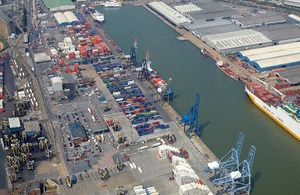DfT publishes new Maritime Decarbonisation Strategy

The Department for Transport has launched its new Maritime Decarbonisation Strategy which it says will help the UK to build a cleaner, more resilient maritime nation.
Fuels of the future and shipping charge points in harbours are at the centre of the major new strategy to make Britain’s shipping fleet net zero by 2050 and drive growth in coastal communities.
The Maritime Minister revealed the government’s new goals for all vessels that operate in UK waters and dock at UK ports to be carbon free and help vessel owners, operators and scientists make emission-free voyages a reality.
Part of the government’s Plan for Change to propel the UK towards becoming a green energy superpower and drive growth, the new Maritime decarbonisation strategy sets out goals to reduce greenhouse gas emissions by 30% by 2030, 80% by 2040 and to zero by 2050. This will see the UK match the highest level of the ambitious goals agreed at the International Maritime Organization (IMO) in their 2023 strategy on reduction of greenhouse gas emission from ships.
Investment in green technologies and fuels will cement the UK as a clean energy superpower and encourage a green economic revival at the local level, helping to build high-skilled jobs in coastal communities and delivering a local boon to cities and towns.
Some key aspects of the new strategy are:
- vessels will soon use future fuels and plug into shipping ‘chargeports’ as part of UK’s new goals for shipping operators to reach net zero by 2050, part of the government’s Plan for Change to make the UK a clean energy superpower
- worst polluting vessels will decarbonise first as government sets out new plans to deliver energy security and build a clean maritime future
- news comes ahead of the UN’s maritime meeting where the UK mission will push for global greenhouse gas reductions across the industry
In addition, the government has also launched 2 calls for evidence to help inform the development of measures needed to reduce emissions at berth, understand the future energy demand at ports and decarbonise smaller vessels.
For more information click here.


